Refine search
Actions for selected content:
104 results
2 - Henry Strakosch and Reconstruction
-
- Book:
- The City's Defense
- Published online:
- 09 October 2025
- Print publication:
- 23 October 2025, pp 66-102
-
- Chapter
- Export citation
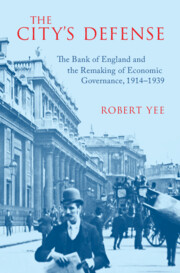
The City's Defense
- The Bank of England and the Remaking of Economic Governance, 1914–1939
-
- Published online:
- 09 October 2025
- Print publication:
- 23 October 2025
Covenants without the Sword: Consent and Enforcement in Market Anarchism
-
- Journal:
- Legal Theory , First View
- Published online by Cambridge University Press:
- 08 October 2025, pp. 1-15
-
- Article
-
- You have access
- Open access
- HTML
- Export citation
Chapter 1 - The nature of international law
-
- Book:
- International Law
- Published online:
- 26 July 2025
- Print publication:
- 31 July 2025, pp 1-49
-
- Chapter
- Export citation
18 - Change in International Order and Legitimacy
- from Part V - International Legitimacy and Change
-
- Book:
- The Law and Politics of International Legitimacy
- Published online:
- 14 July 2025
- Print publication:
- 24 July 2025, pp 350-360
-
- Chapter
- Export citation
Conclusion
-
- Book:
- The Law and Politics of International Legitimacy
- Published online:
- 14 July 2025
- Print publication:
- 24 July 2025, pp 488-491
-
- Chapter
- Export citation
17 - Change of International Order and Legitimacy
- from Part V - International Legitimacy and Change
-
- Book:
- The Law and Politics of International Legitimacy
- Published online:
- 14 July 2025
- Print publication:
- 24 July 2025, pp 318-349
-
- Chapter
- Export citation
Introduction
-
- Book:
- The Law and Politics of International Legitimacy
- Published online:
- 14 July 2025
- Print publication:
- 24 July 2025, pp 1-8
-
- Chapter
- Export citation
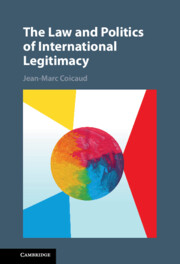
The Law and Politics of International Legitimacy
-
- Published online:
- 14 July 2025
- Print publication:
- 24 July 2025
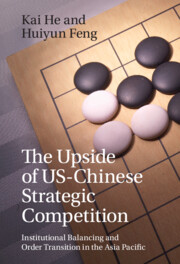
The Upside of US-Chinese Strategic Competition
- Institutional Balancing and Order Transition in the Asia Pacific
-
- Published online:
- 25 June 2025
- Print publication:
- 05 June 2025
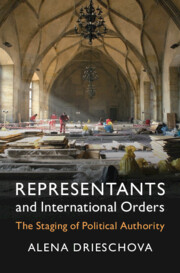
Representants and International Orders
- The Staging of Political Authority
-
- Published online:
- 15 May 2025
- Print publication:
- 08 May 2025
2 - Stability and Change of International Orders
- from Part I
-
- Book:
- Representants and International Orders
- Published online:
- 15 May 2025
- Print publication:
- 08 May 2025, pp 26-64
-
- Chapter
- Export citation
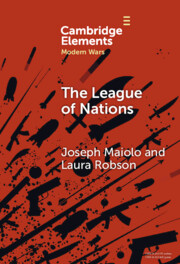
The League of Nations
-
- Published online:
- 20 February 2025
- Print publication:
- 20 February 2025
-
- Element
-
- You have access
- Open access
- HTML
- Export citation
Introduction
-
- Book:
- Ethnos of the Earth
- Published online:
- 12 December 2024
- Print publication:
- 19 December 2024, pp 1-28
-
- Chapter
- Export citation
3 - Histories of East Asian International Relations
- from Part II - Historical Background
-
- Book:
- East Asian International Relations
- Published online:
- 28 November 2024
- Print publication:
- 19 December 2024, pp 57-88
-
- Chapter
- Export citation
2 - Race
-
- Book:
- Ethnos of the Earth
- Published online:
- 12 December 2024
- Print publication:
- 19 December 2024, pp 79-164
-
- Chapter
- Export citation
Who Can Govern from a House on Fire? International Order, State Responsibility, and the Problem of Solar Radiation Modification
-
- Journal:
- Ethics & International Affairs / Volume 38 / Issue 3 / Fall 2024
- Published online by Cambridge University Press:
- 16 December 2024, pp. 243-254
-
- Article
-
- You have access
- Open access
- HTML
- Export citation
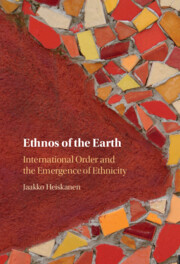
Ethnos of the Earth
- International Order and the Emergence of Ethnicity
-
- Published online:
- 12 December 2024
- Print publication:
- 19 December 2024
Rethinking International Order
-
- Journal:
- Ethics & International Affairs / Volume 38 / Issue 2 / Summer 2024
- Published online by Cambridge University Press:
- 22 November 2024, pp. 200-208
-
- Article
-
- You have access
- Open access
- HTML
- Export citation
World Order from Birmingham Jail
-
- Journal:
- Ethics & International Affairs / Volume 38 / Issue 2 / Summer 2024
- Published online by Cambridge University Press:
- 22 November 2024, pp. 152-161
-
- Article
-
- You have access
- Open access
- HTML
- Export citation
